Diplomatic Bluebook 2023
Chapter 2
Japan's Foreign Policy by Region
3 LAC Countries
(1) Mexico
President Andrés Manuel López Obrador, who was inaugurated in December 2018, has promoted policies emphasizing domestic affairs such as combating corruption, correcting disparities, and improving security, while continuing free trade since his administration took office. By minimizing restrictions on movement and economic activities during the spread of COVID-19, the economy began to recover relatively quickly, which helped maintain President López Obrador's continued high approval rating entering 2022.
In regard to relations with Japan, economic relations have been strengthened in recent years, and approximately 1,300 Japanese companies, the largest number in the LAC region, have established operations in Mexico. In February, the 12th meeting of the Committee for the Improvement of the Business Environment, which was established under the Japan-Mexico Economic Partnership Agreement, was held to discuss and exchange views on issues and concerns related to the business environment. In May, State Minister of Foreign Affairs ODAWARA Kiyoshi visited Mexico to attend the ceremony commemorating the 125th anniversary of Japanese immigration to Mexico and the opening ceremony of the National Convention of Nikkei. He also held discussions with people related to the Government of Mexico on strengthening bilateral political and economic relations, cooperation on various issues of the international community including the situation in Ukraine, and other such matters, and confirmed close cooperation.
In September, Foreign Minister Hayashi held a Japan-Mexico Foreign Ministers' Meeting with Secretary of Foreign Affairs Marcelo Ebrard, who was visiting Japan to attend the state funeral for the late Prime Minister ABE Shinzo. During the meeting, the ministers confirmed further strengthening of strategic ties with Mexico, as well as close collaboration in the international arena, such as strengthening the functions of the UN as a whole, including Security Council reform. The ministers also confirmed the importance of improving the business environment as well as legal stability and maintaining the high standards of the CPTPP, and concurred to promote cooperation between Japan and the PA, which was chaired by Mexico at the time.
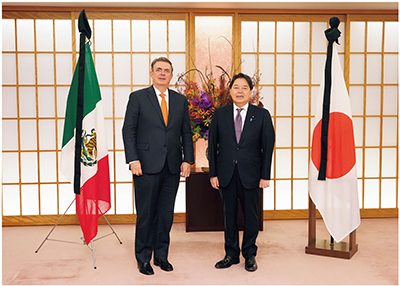 Japan-Mexico Foreign Ministers' Meeting (September 26, Tokyo)
Japan-Mexico Foreign Ministers' Meeting (September 26, Tokyo)In regard to relations with the United States (U.S.), the President of Mexico did not attend the Summit of the Americas hosted by the U.S. in June, criticizing the fact that some countries were not invited. On the other hand, a U.S.-Mexico Summit Meeting was held in July to discuss the economy, border and migration issues, climate change, and other matters. The U.S.-Mexico High-Level Economic Dialogue and the U.S.-Mexico High-Level Security Dialogue (ministerial level) were respectively held in September and October, and the 10th North American Leaders' Summit was held in January 2023. In addition, the Government of Mexico amended the Electricity Industry Law in the energy and power generation field, which is of great domestic interest. The Government also attempted to amend the Constitution to strengthen state authority, but this was rejected by Congress. Meanwhile, the U.S. and Canada are holding talks with Mexico based on the U.S.-Mexico-Canada Agreement (USMCA), claiming that Mexico's policies unfairly harm the U.S. and Canadian companies and violate the agreement.
Did you know that there is a training program that has been building bridges between Japan and Mexico for half a century? The Cooperation Program for the Training of Human Resources for the Strategic Global Partnership between Japan and Mexico. While there are people-to-people exchanges between various countries, this is a unique exchange that has supported ties between Japan and Mexico for over 50 years.
The training program was proposed by then President Luis Echeverría of Mexico, with the aim of actually conducting a people-to-people exchange that would go beyond the mutual exchange of trainees from both countries and the acquisition of knowledge in a wide range of areas, including language and culture. In response, in 1971, the Government of Japan responded launching the “Japan-Mexico Young Technician Exchange Program,” the predecessor of the current exchange program between the governments of the two countries. Since then, the program has been implemented not only to promote mutual interest in each other's country and exchange at the grassroots level, but also as a symbolic program of friendship. More than 4,800 Japanese and Mexican people have participated in the training programs through 49 dispatches to date.
The participants have diverse backgrounds, including students, public officials, organization officials, and sister city residents. They also have a wide range of interests, from language acquisition to politics and economics, history, culture, engineering, public health, IT, and education. By learning about a variety of matters beyond their respective fields of expertise, cooperating with other trainees, and building relationships with the local people, trainees continue their exchanges while deepening their understanding of each other's cultures from generation to generation. They greatly contribute to the strengthening of Japan-Mexico relations, as representatives of their respective countries during the program, as well as by being people with a great affinity toward Mexico and Japan, as people who encourage and lead efforts to strengthen the bilateral relationships in all fields after returning to their countries..
Furthermore, by learning language, the trainees have been able to expand their activities beyond just Japan and Mexico to Latin America and the Caribbean (LAC) countries, where Spanish is the official language like Mexico. Many of the former trainees are now working at the forefront of various industries by leveraging the language skills, expertise, and overseas experience they gained through the program.
The implementation of the program was suspended due to the spread of COVID-19 that began in 2019, but trainee dispatches were resumed in FY2022 after approximately three years. In FY2023, the program marks the 50th dispatch since its launch. It is expected that more people will experience this training program with a long-established tradition going forward, and that the activities of the trainees will further activate exchanges between Japan and Mexico and other LAC countries, thereby building even stronger and closer relations between Japan and Mexico as partners that share fundamental values.
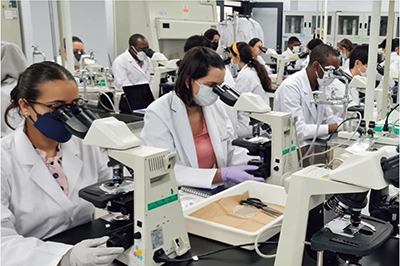 Mexican trainees studying in a Japanese laboratory
Mexican trainees studying in a Japanese laboratory Japanese trainees posing for a commemorative photo on the campus of the National Autonomous University of Mexico
Japanese trainees posing for a commemorative photo on the campus of the National Autonomous University of Mexico(2) Central America (El Salvador, Guatemala, Costa Rica, Dominican Republic, Nicaragua, Panama, Belize, and Honduras)
In addition to the Japan-Honduras Foreign Ministers' Meeting held during the visit to Japan in July by the Minister for Foreign Affairs and International Cooperation of Honduras, Foreign Minister Hayashi held a Japan-El Salvador Foreign Ministers' Meeting, Japan-Panama Foreign Ministers' Meeting, and Japan-Honduras Foreign Ministers' Meeting in September with his counterparts from each country who visited Japan to attend the state funeral for the late Prime Minister ABE Shinzo. Moreover, Foreign Minister Hayashi held a Japan-Costa Rica Foreign Ministers' Meeting in November during the visit to Japan by the Minister of Foreign Affairs and Worship as well as the Minister of Foreign Trade of Costa Rica. Through these meetings, Foreign Minister Hayashi exchanged views with Central American countries, with which Japan has traditionally had friendly relations, regarding cooperation for the maintenance and strengthening of a free and open international order based on the rule of law as well as measures to address the challenges facing the international community, including COVID-19 countermeasures.
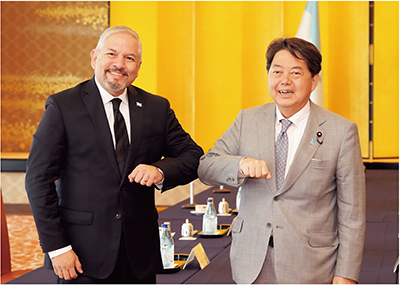 Japan-Honduras Foreign Ministers' Meeting (July 4, Tokyo)
Japan-Honduras Foreign Ministers' Meeting (July 4, Tokyo)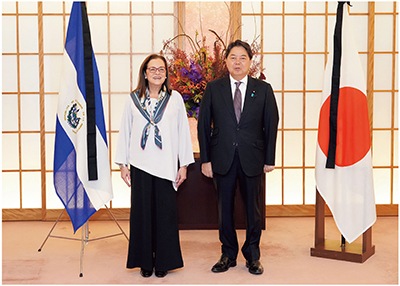 Japan-El Salvador Foreign Ministers' Meeting (September 26, Tokyo)
Japan-El Salvador Foreign Ministers' Meeting (September 26, Tokyo)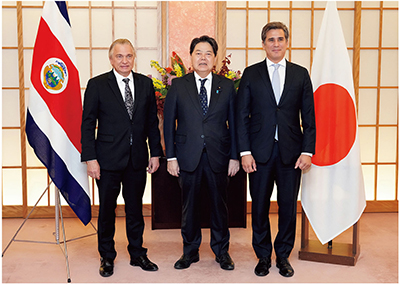 Japan-Costa Rica Foreign Ministers' Meeting (November 8, Tokyo)
Japan-Costa Rica Foreign Ministers' Meeting (November 8, Tokyo)In addition, Ambassador on Special Mission UTO Takashi (member of the House of Councillors) attended the inauguration of the President of Honduras in January, and Ambassador on Special Mission NISHIMURA Yasutoshi (member of the House of Representatives) attended the inauguration of the President of Costa Rica in May. In June, Parliamentary Vice-Minister for Foreign Affairs Uesugi visited Belize, and held meetings with government dignitaries and attended a ceremony for the delivery of medical equipment provided through grant aid. In addition, in August, Costa Rica applied to join the CPTPP. Furthermore, Japan provided emergency relief supplies in October to Honduras to address the damage from prolonged rain and to Guatemala for the damage caused by Hurricane Julia, and in November to Belize for the damage caused by Hurricane Lisa.
(3) Cuba
Due to the global spread of COVID-19, Cuba's economy, including the major industry of tourism, continues to be damaged, and the lives of the people have become more difficult. In terms of relations with the U.S., although Cuba joined Nicaragua and Venezuela in not being invited to the 9th Summit of the Americas in June, the U.S. announced in May that some restrictions on entry into the country from Cuba had been eased. In September, Prime Minister Kishida held a Japan-Cuba Summit Meeting with Prime Minister Manuel Marrero Cruz, who was visiting Japan to attend the state funeral for the late Prime Minister ABE Shinzo, and discussed bilateral relations, initiatives in the international arena, and regional situations. Furthermore, Japan provided emergency relief supplies to Cuba in response to the damage caused by Hurricane Ian in October.
(4) Brazil
While President Jair Bolsonaro has been criticized for his COVID-19 countermeasures, he has not changed his stance of emphasizing the importance of the economy since taking office and has been advancing reform such as deliberation on tax reform legislation and privatization. Presidential elections were held in October, and former President Luiz Inácio Lula da Silva defeated President Bolsonaro in a run-off to become the new president in January 2023.
Regarding relations with Japan, Japan provided emergency relief supplies to Brazil in response to the flood disaster that occurred in the country in January. In May, State Minister for Foreign Affairs Odawara visited Brazil and exchanged views with government officials on the situation in Ukraine, regional affairs, economic security, and other matters, and confirmed that the two countries will further promote strategic cooperation in the international arena. In addition, in September, Foreign Minister Hayashi held a meeting with Foreign Minister Carlos França on the occasion of the UN General Assembly and confirmed that Japan and Brazil, both of which serve as non-permanent members of the UN Security Council in 2023, will cooperate to strengthen the functions of the UN as a whole, including Security Council reform, as ensuring the rule of law becomes increasingly important. The two ministers also shared the view that Japan-Brazil economic relations have great potential, and concurred to discuss initiatives toward 5G and decarbonization. Furthermore, dialogue between Japan and Brazil has been reinvigorated through such meetings as the Wise Group for Strategic Economic Partnership between Japan and Brazil held in July, the meeting of the Brazil-Japan Business Council in September, the Japan-Brazil Consular Coordination Meeting in September, and the meeting of the Joint Committee on Cooperation in Science and Technology in September.
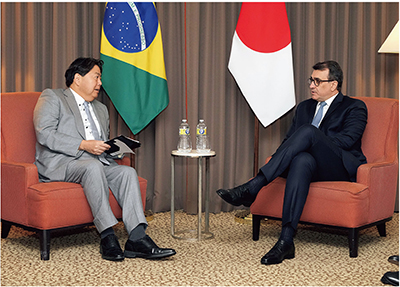 Japan-Brazil Foreign Ministers' Meeting (September 22, New York, the U.S.)
Japan-Brazil Foreign Ministers' Meeting (September 22, New York, the U.S.)(5) Argentina
In March, the Alberto Fernández administration established a new program with the International Monetary Fund (IMF) to provide immediate funding for the country's pending external debt restructuring, and in October, it reached an agreement with the Paris Club for the restructuring of overdue debt. Argentina continues to face the challenge of increasing foreign currency revenues and investment through export promotion, and it is important for the country to realize economic growth that its citizens can actually feel in their lives.
In regard to relations with Japan, Prime Minister Kishida held informal talks with the President of Argentina during the G7 Summit in June, in which the two leaders affirmed the importance of strengthening the relationship between the two countries including through the Nikkei communities, and concurred to work closely together as “Strategic Partners” that share fundamental values. In July, a Japan-Argentina Foreign Ministers' Meeting was held during the G20 Foreign Ministers' Meeting, in which the ministers concurred to cooperate closely in various fields to further strengthen bilateral relations, and also confirmed cooperation on issues such as Russia's aggression against Ukraine and the situation in East Asia. In October, State Minister for Foreign Affairs Takei visited Argentina and paid a courtesy call to Minister of Foreign Affairs, International Trade and Worship Santiago Andrés Cafiero. In November, Foreign Minister Hayashi held a Japan-Argentina foreign ministers' telephone call with Minister of Foreign Affairs, International Trade and Worship Cafiero, while Prime Minister Kishida held informal talks with the President of Argentina during the G20 Summit, and the ministers and the leaders confirmed the strengthening of bilateral relations and cooperation in the international arena.
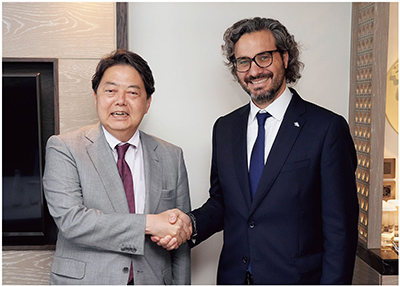 Japan-Argentina Foreign Ministers' Meeting (July 7, Bali, Indonesia)
Japan-Argentina Foreign Ministers' Meeting (July 7, Bali, Indonesia)(6) Peru
The Pedro Castillo administration, which was inaugurated in July 2021, advocated, among other issues, socialist economic policies, convening of the Constitutional Assembly (constitutional reform), countermeasures against COVID-19, and the restoration of political stability. However, the Prime Minister and other cabinet members were replaced one after another, and in December President Castillo was removed from office and Vice President Dina Boluarte assumed the presidency.
Regarding relations with Japan, Foreign Minister Hayashi held informal talks with the Foreign Minister of Peru during the APEC Ministerial Meeting in November, in which the ministers confirmed the importance of bilateral relations supported by strong ties, given that 2023 is the 150th anniversary of the establishment of diplomatic relations. The two ministers also shared the view to closely cooperate to further strengthen relations in the future.
(7) Chile
In March, leftist candidate Gabriel Boric assumed the presidency of Chile. Aiming to reduce disparities, the Boric administration has announced plans to work on tax reform such as strengthening taxation on the wealthy and introducing mining royalties, establishing a universal health care system, and creating a state-owned lithium company. On the diplomatic front, Chile has set forth its approach of placing importance on human rights, gender, the environment, multilateralism, and relations with the LAC and Asia-Pacific regions. Chile also completed its domestic procedure for the entry into force of the CPTPP in December.
The draft of a new constitution, which took a year to prepare by the Constitutional Convention, was not approved after a referendum was held in September. However, it was decided to initiate a new constitution-drafting process.
In regard to relations with Japan, 2022 marked the 125th anniversary of the establishment of diplomatic relations between Japan and Chile. In February, Foreign Minister Hayashi held a video conference with Minister-Designate of Foreign Affairs Antonia Urrejola Noguera. In March, State Minister for Foreign Affairs Odawara attended the inauguration of President Boric as Ambassador on Special Mission. In addition, Parliamentary Vice-Minister for Foreign Affairs MIYAKE Shingo met with Undersecretary for International Economic Relations José Miguel Ahumada in May, and Undersecretary of Foreign Relations Ximena Carolina Fuentes Torrijo in June. A Japan-Chile Foreign Ministers' Meeting was held in September during the UN General Assembly, and a Japan-Chile Summit Meeting was held during the APEC Economic Leaders' Meeting in November, in which the two leaders confirmed that the two countries would deepen bilateral relations, including in addressing various challenges of the international community, as important strategic partners that share fundamental values.
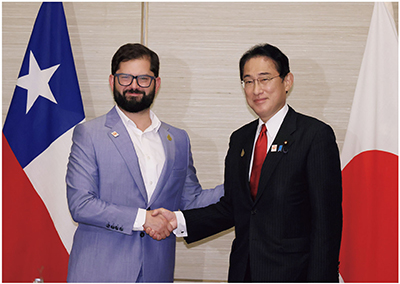 Japan-Chile Summit Meeting (November 17, Bangkok, Thailand; Photo: Cabinet Public Affairs Office)
Japan-Chile Summit Meeting (November 17, Bangkok, Thailand; Photo: Cabinet Public Affairs Office)(8) Uruguay
The Luis Lacalle Pou administration, which was inaugurated in March 2020, has maintained a high approval rating since its inauguration due to factors such as the high vaccination rate achieved. In economic policy, the administration adheres to free trade principles and places importance on market expansion and liberalization. In December, Uruguay applied to join the CPTPP. As for foreign policy, it has developed diplomacy based on the values of democracy, the rule of law, and the protection of human rights.
Regarding relations with Japan, Foreign Minister Hayashi held a Japan-Uruguay Foreign Ministers' video conference in February, in which the two ministers concurred on cooperation to further strengthen bilateral relations in 2022, the dawn of a new century of relations, in light of the 100th anniversary of the establishment of diplomatic relations between the two countries in 2021.
In October, President Lacalle Pou paid an Official Working Visit to Japan and held a summit meeting. The two leaders shared the intention to establish the Joint Committee to discuss mainly bilateral economic relations and to promote public-private cooperation in the digital sector, and welcomed the introduction of the working holiday program. They also confirmed cooperation on the situations in Ukraine and East Asia. Furthermore, the two leaders issued a joint statement to strengthen bilateral relations for the next 100 years. Foreign Minister Hayashi held a Japan-Uruguay Foreign Ministers' Meeting with Foreign Minister Francisco Bustillo Bonasso, who accompanied President Lacalle Pou. The two ministers concurred to further strengthen cooperation.
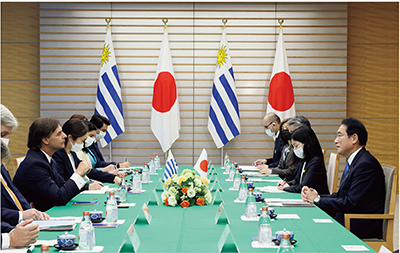 Japan-Uruguay Summit Meeting (October 28, Tokyo; Photo: Cabinet Public Affairs Office)
Japan-Uruguay Summit Meeting (October 28, Tokyo; Photo: Cabinet Public Affairs Office)(9) Paraguay
The Mario Abdo Benitez administration, which was inaugurated in August 2018, continues to promote its free and open economic policies and is working on poverty measures, security and drug countermeasures, and anti-corruption measures as key issues.
In regard to relations with Japan, State Minister for Foreign Affairs Takei, who visited Argentina in October to attend the ECLAC session, met with Foreign Minister Julio César Arriola Ramírez and concurred on continuation of close cooperation in maintaining and strengthening a free and open international order based on the rule of law as well as in regional situations.
(10) Colombia
Candidate Gustavo Francisco Petro Urrego, who won the presidential election runoff in June, assumed the presidency in August. The Petro administration has been advancing efforts to achieve “total peace” including for the armed groups that did not participate in the implementation of the 2016 peace agreement5, tax reform, and the normalization of relations with Venezuela.
In regard to relations with Japan, Special Envoy of the Prime Minister YAMAGUCHI Shunichi (member of the House of Representatives) attended the inauguration ceremony of President Petro and also held a meeting with him, in which the two sides confirmed that they would continue to strengthen bilateral relations. In September, the first Japan-Colombia Foreign Ministers' Meeting since the inauguration of the new administration took place during the UN General Assembly, and First Lady Verónica del Socorro Alcocer García visited Japan to attend the state funeral for the late Prime Minister ABE Sinzo and held a meeting with KISHIDA Yuko, the spouse of Prime Minister Kishida. In addition, the Tax Convention between Japan and Colombia entered into force in September.
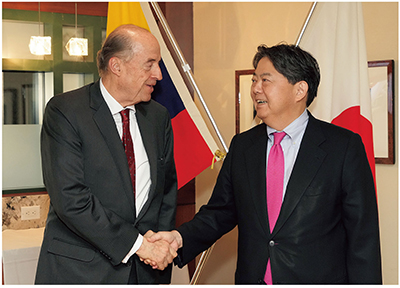 Japan-Colombia Foreign Ministers' Meeting (September 21, New York, the U.S.)
Japan-Colombia Foreign Ministers' Meeting (September 21, New York, the U.S.)- 5 Then-President Santos started the peace talks with the Revolutionary Armed Forces of Colombia (FARC), the largest guerilla organization in Colombia, in 2012 in order to end the domestic strife that had lasted for over half a century. The peace agreement was announced in 2016.
(11) Venezuela
The inauguration ceremony for President Nicolás Maduro was held in January 2019 amidst doubts about the legitimacy of the presidential election held in May 2018. In December 2020, the election for Venezuela's National Assembly was held without the participation of the main opposition parties, and the Maduro administration's party was declared the winner. In response, people in Venezuela, including the main opposition party, as well as the international community reacted against the election, claiming that it lacked legitimacy. Similarly, Japan has been calling for the restoration of democracy in Venezuela through the early implementation of a free and fair election.
In August 2021, a dialogue between parties began in Mexico under the mediation of Norway, but it was temporarily suspended in October. The dialogue was resumed in November 2022.
Due to the worsening economic, social, and humanitarian situation in the country, Venezuelan nationals are continuing to flow into neighboring countries as refugees and migrants, and receiving them has become a regional challenge. Japan has been providing support to the Venezuelan people, including people fleeing from Venezuela, as well as to affected neighboring countries.
(12) Bolivia
The Luis Alberto Arce administration, which was inaugurated in November 2020, is focusing on COVID-19 countermeasures and judicial reform. In addition, on the economic front, the administration is making efforts for investment in public works projects, particularly aiming to strengthen import-substitution industries, including energy, lithium, and biodiesel plant construction. On the other hand, Bolivia faces challenges in dealing with corruption and various social issues, as well as the implementation of fair general elections scheduled for 2025.
(13) Ecuador
The Guillermo Lasso administration, which was inaugurated in May 2021, is working to strengthen relations with the U.S., the EU, and other Western countries, as well as with the IMF and other international financial institutions. It also aims to stimulate the economy through the promotion of free trade and the attraction of foreign investment. On the other hand, the ruling Creating Opportunities Party has only 12 out of 137 seats in the unicameral National Assembly, and smooth legislative management continues to be an issue as a coalition and cooperation have not been achieved.
In regard to relations with Japan, a Japan-Ecuador Foreign Ministers' Meeting was held in June, and State Minister for Foreign Affairs Takei, who visited Argentina in October to attend the ECLAC session, held a meeting with Minister of Foreign Affairs and Human Mobility Juan Carlos Holguín Maldonado, in which both sides concurred to further develop bilateral relations and to closely cooperate in the international arena.
(14) Collaboration with the Nikkei Community
The Nikkei community has fostered a sense of affinity toward Japan in LAC countries. Nevertheless, generations have transitioned over 100 years since Japanese immigration to LAC countries began, and thus, how to deepen ties to Japan among the community, including among the younger generation, has become a challenge. Amid this situation, in addition to inviting young Nikkei people to visit Japan, Japan also implements measures towards strengthening collaboration with the Nikkei community, through supporting events by young Nikkei people in various LAC countries and creating networks among them.
In March, the International Conference of Young LAC Nikkei was jointly held online by the Former MOFA Trainees Association Latin America, which is made up of former MOFA invitees, and Junior Chamber International Brasil-Japão (JCI Brasil-Japão). Parliamentary Vice-Minister for Foreign Affairs Uesugi gave a video message at the conference. In October, seven next-generation Nikkei leaders from four LAC countries visited Japan and paid a courtesy call to Deputy Chief Cabinet Secretary KIHARA Seiji. In the same month, a meeting of the Former MOFA Trainees Association Latin America was held in Paraguay, where Parliamentary Vice-Minister for Foreign Affairs Akimoto delivered a message, promoting collaboration among the Nikkei community beyond national borders. Japan is making such efforts for collaboration of the Nikkei community that transcends national borders. In December, Japan allocated 640 million Japanese yen in the supplementary budget to subsidize the costs of support for projects through JICA to realize the idea of a “New Form of Capitalism” in cooperation with the LAC Nikkei community, and aims to contribute to sustainable economic development in Japan and the fostering of affinity toward Japan.

